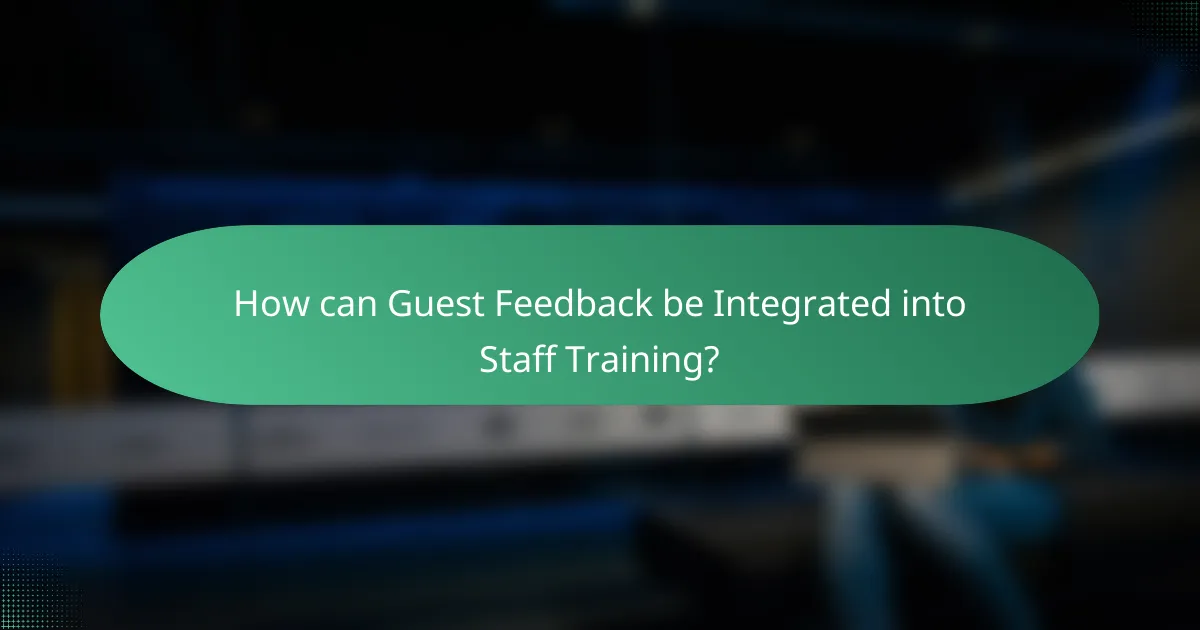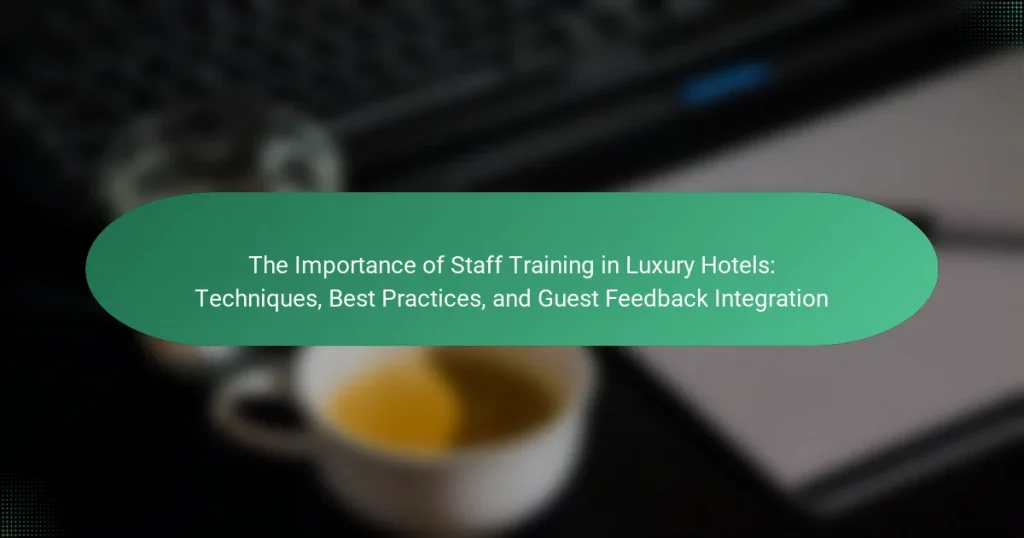Staff training is essential in luxury hotels for maintaining high service quality and meeting guest expectations. Effective training programs can lead to increased guest satisfaction and loyalty, significantly impacting hotel revenue and reducing employee turnover. Techniques such as personalized training, role-playing scenarios, and continuous feedback are vital for developing staff skills and enhancing service delivery. Best practices for implementing training include setting clear objectives, utilizing engaging content, and regularly evaluating effectiveness. Integrating guest feedback into training processes further improves service quality and aligns staff performance with guest needs.

Why is Staff Training Important in Luxury Hotels?
Staff training is crucial in luxury hotels to ensure exceptional service quality. Trained staff can meet high guest expectations consistently. This leads to increased guest satisfaction and loyalty. According to a study by the American Hotel and Lodging Educational Institute, well-trained employees can boost a hotel’s revenue by 10-15%. Training also reduces employee turnover, which is significant in the hospitality industry. High turnover can disrupt service continuity and affect guest experiences. Additionally, staff training fosters a culture of professionalism. This culture enhances the hotel’s reputation and competitive edge. Thus, effective staff training is a key driver of success in luxury hotels.
What are the key objectives of staff training in luxury hotels?
The key objectives of staff training in luxury hotels are to enhance service quality, improve employee skills, and ensure guest satisfaction. Training focuses on developing interpersonal skills and knowledge about luxury offerings. It also aims to instill brand values and standards in employees. Effective training leads to increased employee confidence and performance. Additionally, staff training helps in reducing turnover rates by fostering employee engagement. According to the American Hotel and Lodging Educational Institute, well-trained staff significantly contribute to a hotel’s reputation and guest loyalty. Overall, these objectives align with the goal of providing exceptional guest experiences.
How does effective training enhance guest experiences?
Effective training enhances guest experiences by equipping staff with essential skills and knowledge. Trained employees provide better service, leading to higher guest satisfaction. They can address guest needs promptly and efficiently. This responsiveness fosters a welcoming atmosphere. Guests appreciate personalized interactions, which trained staff can deliver. Research shows that 70% of customers are willing to pay more for better service. Moreover, effective training reduces employee turnover, ensuring consistency in guest experiences. Consistent service quality builds brand loyalty among guests.
What role does staff training play in maintaining brand reputation?
Staff training is crucial for maintaining brand reputation. It ensures that employees understand the brand values and service standards. Well-trained staff deliver consistent and high-quality service. This consistency builds customer trust and loyalty. According to a study by the American Society for Training and Development, companies with comprehensive training programs have 218% higher income per employee. Additionally, effective training reduces employee turnover, which can negatively impact brand perception. In luxury hotels, where service quality is paramount, ongoing training is essential. It helps staff handle guest feedback and adapt to changing expectations. Overall, staff training directly influences customer experiences and brand reputation.
How does staff training impact employee satisfaction and retention?
Staff training significantly enhances employee satisfaction and retention. Effective training programs equip employees with necessary skills and knowledge. This empowerment leads to increased job confidence and performance. Employees who feel competent are more likely to enjoy their work. A satisfied workforce tends to remain with the organization longer. Research indicates that companies with robust training programs have 218% higher income per employee. Furthermore, organizations with strong onboarding processes can improve retention by 82%. Thus, investing in staff training directly correlates with higher satisfaction and lower turnover rates.
What are the correlations between training and employee morale?
Training positively correlates with employee morale. Effective training enhances skills and confidence among employees. This leads to increased job satisfaction. Employees who feel competent are more engaged in their work. A study by the Association for Talent Development found that companies with comprehensive training programs have 218% higher income per employee. Additionally, 40% of employees reported feeling more motivated after receiving training. Improved morale reduces turnover rates. Higher retention benefits the organization by maintaining expertise. Overall, training fosters a more positive workplace culture.
How can training programs reduce staff turnover rates?
Training programs can significantly reduce staff turnover rates by enhancing employee engagement and job satisfaction. Well-structured training equips employees with necessary skills. This leads to increased confidence in their roles. Employees who feel competent are less likely to seek employment elsewhere.
Moreover, training fosters a sense of belonging and loyalty. When employees see investment in their development, they are more committed to the organization. According to a study by the Association for Talent Development, organizations that offer comprehensive training programs have 218% higher income per employee.
Additionally, effective training reduces the learning curve for new hires. This means that employees become productive faster, leading to a more stable workforce. In luxury hotels, where service quality is paramount, retaining trained staff ensures consistent guest experiences.

What Techniques are Effective for Staff Training in Luxury Hotels?
Effective techniques for staff training in luxury hotels include personalized training programs, role-playing scenarios, and continuous feedback mechanisms. Personalized training programs cater to individual staff needs, enhancing skill development. Role-playing scenarios simulate real-life situations, allowing staff to practice customer interactions. Continuous feedback mechanisms ensure ongoing improvement and adaptation to guest expectations. Research shows that hotels with tailored training programs achieve higher guest satisfaction ratings. For instance, a study by the Cornell University School of Hotel Administration found that personalized training can increase employee engagement and performance.
What types of training methods are commonly used in luxury hotels?
Luxury hotels commonly use various training methods to enhance staff performance. On-the-job training is prevalent, allowing employees to learn in real-time under supervision. Simulation training is also utilized, enabling staff to practice scenarios they may encounter. E-learning platforms are increasingly popular, offering flexible access to training materials. Workshops and seminars provide in-depth knowledge on specific topics. Mentorship programs pair experienced staff with newer employees for guidance. Role-playing exercises help staff improve their customer service skills. Regular performance reviews and feedback sessions reinforce learning and development. These methods collectively ensure high service standards in luxury hotels.
How does on-the-job training differ from classroom training?
On-the-job training occurs in the actual work environment, while classroom training takes place in a separate educational setting. On-the-job training allows employees to learn through hands-on experience. This method often involves real tasks and immediate feedback from supervisors. In contrast, classroom training focuses on theoretical knowledge and structured learning. It typically involves lectures, discussions, and assessments. According to research by the National Center for Education Statistics, 70% of learning in the workplace occurs through on-the-job experiences. This statistic underscores the effectiveness of practical training in enhancing employee skills.
What role do simulations and role-playing play in training?
Simulations and role-playing are essential tools in training, particularly in luxury hotels. They provide realistic scenarios for staff to practice skills in a safe environment. This hands-on approach enhances learning by allowing employees to experience real-life situations. It fosters teamwork and communication among staff members. Studies show that experiential learning improves retention rates. For instance, a study by the National Training Laboratory found that people retain 75% of what they learn through practice. Simulations also help identify areas for improvement in service delivery. Overall, these techniques are crucial for developing competent and confident hotel staff.
How can technology enhance training programs in luxury hotels?
Technology can enhance training programs in luxury hotels by providing interactive and personalized learning experiences. E-learning platforms allow staff to access training materials anytime and anywhere. Virtual reality (VR) simulations can create realistic scenarios for skills practice. Mobile applications can deliver bite-sized training modules for quick learning. Data analytics can track employee progress and identify knowledge gaps. Online assessments can ensure understanding and retention of critical information. These methods increase engagement and improve overall training effectiveness. A study by the American Hotel and Lodging Educational Institute found that technology-driven training increases staff retention rates by 30%.
What are the benefits of using e-learning platforms for staff training?
E-learning platforms enhance staff training by providing flexibility and accessibility. Employees can engage in training at their own pace and convenience. This method accommodates different learning styles effectively. E-learning also reduces training costs significantly. Traditional training often incurs travel and venue expenses. In contrast, e-learning eliminates these costs. Additionally, e-learning platforms offer a wide range of resources. Interactive content can improve retention and engagement. Studies show that e-learning can increase knowledge retention rates by 25% to 60%. This method allows for consistent training across multiple locations. Uniformity in training ensures all staff receive the same information. Overall, e-learning platforms streamline the training process for luxury hotel staff.
How can virtual reality be utilized in training scenarios?
Virtual reality can be utilized in training scenarios by providing immersive simulations for staff. It allows employees to practice real-world situations in a controlled environment. This method enhances learning retention and engagement. For instance, VR can simulate guest interactions in luxury hotels. Staff can experience various scenarios, such as handling difficult guests or managing peak hours. Research shows that VR training improves performance by 70% compared to traditional methods. Additionally, it reduces training costs by minimizing the need for physical resources. Overall, virtual reality offers a dynamic approach to staff training.

What are the Best Practices for Implementing Staff Training?
The best practices for implementing staff training include clear objectives, engaging content, and ongoing evaluation. Defining clear training objectives aligns the program with organizational goals. Engaging content enhances learning retention and application. Utilizing various training methods, such as workshops and e-learning, caters to different learning styles. Incorporating real-life scenarios helps staff apply skills in practical situations. Providing regular feedback during training sessions fosters improvement and motivation. Evaluating training effectiveness through assessments and performance metrics ensures continuous enhancement. Research by the Association for Talent Development shows that organizations with effective training programs see 218% higher income per employee.
How should luxury hotels assess their training needs?
Luxury hotels should assess their training needs through a systematic evaluation process. This process involves identifying specific skills required for high-quality service. Conducting surveys among staff can reveal gaps in knowledge and skills. Analyzing guest feedback provides insights into areas needing improvement. Reviewing industry standards helps ensure training aligns with luxury service expectations. Regular performance reviews can highlight individual training needs. Collaborating with management can identify strategic training goals. Finally, benchmarking against competitor training programs can offer valuable insights.
What metrics can be used to evaluate training effectiveness?
Metrics to evaluate training effectiveness include knowledge assessments, skill demonstrations, and performance metrics. Knowledge assessments measure retention of training content through tests or quizzes. Skill demonstrations evaluate employees’ ability to apply learned skills in real scenarios. Performance metrics track improvements in job-related outcomes, such as sales figures or customer satisfaction scores. Additionally, feedback surveys from participants can provide insights into perceived training value. According to a study by the Association for Talent Development, organizations that measure training effectiveness see a 24% higher profit margin.
How can feedback from staff improve training programs?
Feedback from staff can significantly enhance training programs. It provides insights into the effectiveness of current training methods. Staff can identify gaps in knowledge and skills that need addressing. Their experiences reveal practical challenges faced during training. Incorporating this feedback leads to more relevant training content. Tailored programs increase engagement and retention of information. Studies show that organizations with feedback mechanisms report higher employee satisfaction. This satisfaction often correlates with improved service quality in luxury hotels.
What role does ongoing training play in staff development?
Ongoing training is essential for staff development as it enhances skills and knowledge. It ensures employees stay updated with industry trends and standards. Regular training sessions improve job performance and increase employee confidence. This leads to higher job satisfaction and retention rates. According to a study by the Association for Talent Development, organizations that invest in ongoing training see a 24% higher profit margin. Furthermore, ongoing training fosters a culture of continuous improvement. This culture encourages innovation and adaptability in a competitive market. In luxury hotels, exceptional service is paramount. Ongoing training equips staff to meet and exceed guest expectations consistently.
How can luxury hotels create a culture of continuous learning?
Luxury hotels can create a culture of continuous learning by implementing structured training programs. These programs should include regular workshops and seminars for staff development. Engaging employees in ongoing education fosters skill enhancement. Offering incentives for completing training can motivate participation. Establishing mentorship programs pairs experienced staff with newcomers. This encourages knowledge sharing and collaboration. Regularly soliciting feedback from employees about training effectiveness is crucial. This practice helps refine and improve learning initiatives. Research indicates that hotels with robust training programs see higher employee satisfaction and retention rates.
What strategies can be used to keep training relevant and engaging?
Incorporating interactive elements keeps training relevant and engaging. Interactive activities enhance participation and retention. Examples include role-playing, simulations, and group discussions. Utilizing real-life scenarios makes training relatable. This approach helps staff connect training with their daily tasks. Regularly updating content ensures it reflects current trends and practices. Incorporating guest feedback into training materials enhances relevance. Surveys and feedback forms provide insights into areas needing improvement. Utilizing technology, such as e-learning platforms, increases accessibility and engagement. Gamification techniques can motivate staff to participate actively. These strategies foster a dynamic learning environment.

How can Guest Feedback be Integrated into Staff Training?
Guest feedback can be integrated into staff training by systematically analyzing feedback data. This process involves collecting guest reviews from various platforms. Staff can then review this feedback during training sessions. Specific examples of feedback should be highlighted for discussion. Role-playing scenarios can be created based on guest comments. This method allows staff to practice responses to common guest concerns. Additionally, training materials should be updated regularly with new feedback insights. Implementing feedback into performance evaluations can also reinforce training objectives. Research indicates that using guest feedback in training improves service quality and guest satisfaction.
Why is guest feedback vital for improving staff performance?
Guest feedback is vital for improving staff performance because it provides direct insights into guest experiences. This feedback highlights areas where staff excel and where they need improvement. It allows management to identify specific training needs based on real guest interactions. Research shows that hotels utilizing guest feedback report a 15% increase in customer satisfaction scores. Additionally, regular feedback fosters a culture of accountability among staff. This encourages employees to strive for higher service standards. Ultimately, guest feedback drives continuous improvement and enhances overall service quality.
How can hotels effectively gather and analyze guest feedback?
Hotels can effectively gather and analyze guest feedback through multiple methods. Surveys are a primary tool for collecting structured feedback. These can be distributed via email or in-person during check-out. Online review platforms also provide insights into guest experiences. Social media channels allow guests to share their opinions publicly.
Analyzing this feedback involves categorizing comments into themes. Hotels can use sentiment analysis tools to gauge overall guest satisfaction. Data analytics software can track trends over time. Regular reviews of this data can inform staff training and service improvements.
Research shows that hotels that actively engage with guest feedback see a 20% increase in customer satisfaction scores. This highlights the importance of feedback in enhancing guest experiences.
What methods can be used to incorporate feedback into training sessions?
Incorporating feedback into training sessions can be achieved through various methods. One effective method is conducting surveys after training sessions. Surveys gather participants’ opinions on the training content and delivery. Another method is utilizing one-on-one feedback sessions. These sessions allow for personalized discussions on strengths and areas for improvement. Group discussions can also be held to facilitate sharing of experiences and suggestions.
Role-playing scenarios can be employed to practice feedback in real-time. This method helps staff apply feedback in simulated situations. Additionally, implementing a feedback loop ensures ongoing evaluation of training effectiveness. Regularly reviewing feedback helps in refining training content.
Lastly, using technology, such as learning management systems, can track progress and collect feedback efficiently. These methods collectively enhance the training experience by making it responsive to staff needs.
What are the challenges in integrating guest feedback into training?
Integrating guest feedback into training presents several challenges. One significant challenge is the variability in feedback quality. Guest feedback can be subjective and inconsistent. This inconsistency makes it difficult to derive actionable insights. Another challenge is the time required to analyze feedback effectively. Staff may struggle to allocate sufficient time for thorough analysis amidst their regular duties. Additionally, there can be resistance from staff in adopting feedback-driven changes. Employees may feel defensive about criticism or doubt the validity of feedback. There is also the issue of aligning feedback with training objectives. Not all feedback directly correlates to training needs, complicating the integration process. Finally, maintaining ongoing engagement with feedback is crucial. Organizations may find it challenging to create a continuous feedback loop that informs training regularly.
How can luxury hotels overcome resistance to feedback implementation?
Luxury hotels can overcome resistance to feedback implementation by fostering a culture of open communication. This involves encouraging staff to share their thoughts without fear of repercussions. Training programs should emphasize the value of feedback for personal and organizational growth. Regular workshops can help staff understand the importance of guest feedback in enhancing service quality. Management should actively demonstrate how feedback leads to tangible improvements. Providing recognition for staff who embrace feedback can motivate others to follow suit. Research shows that organizations with a feedback-friendly culture experience higher employee engagement and satisfaction. This ultimately leads to better guest experiences and loyalty.
What systems can be established to ensure feedback is actionable?
Establishing a structured feedback system ensures feedback is actionable. Implementing regular training sessions helps staff understand feedback processes. Utilizing digital platforms for real-time feedback collection increases response efficiency. Creating a feedback loop allows for continuous improvement based on guest insights. Assigning specific team members to analyze feedback fosters accountability. Regularly scheduled review meetings ensure ongoing discussion of feedback trends. Incorporating guest feedback into staff performance evaluations encourages proactive engagement. These systems have been shown to enhance service quality in luxury hotels.
What are some practical tips for enhancing staff training in luxury hotels?
Implementing personalized training programs enhances staff training in luxury hotels. Tailoring training to individual roles increases engagement and effectiveness. Incorporating real-life scenarios fosters practical skills. Regular feedback sessions provide opportunities for improvement. Utilizing technology for e-learning offers flexibility and accessibility. Collaborating with industry experts introduces best practices. Encouraging cross-departmental training enhances teamwork and service consistency. Tracking performance metrics ensures training effectiveness and identifies areas for further development.
The main entity of this article is staff training in luxury hotels. The article emphasizes the critical role of staff training in enhancing service quality, improving employee satisfaction, and maintaining brand reputation within the luxury hospitality sector. It outlines key objectives of training, effective techniques such as personalized programs and simulations, and best practices for implementation. Additionally, the integration of guest feedback into training is highlighted as a vital component for continuous improvement and achieving exceptional guest experiences. Overall, the content provides a comprehensive overview of how effective staff training drives success in luxury hotels.




